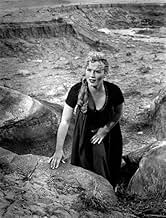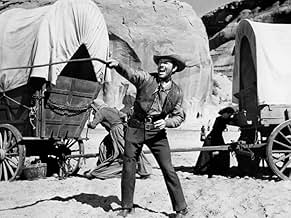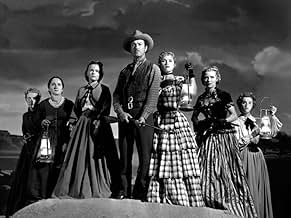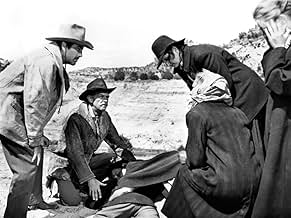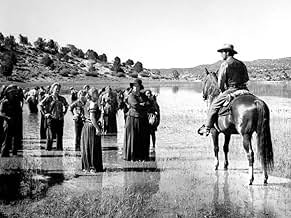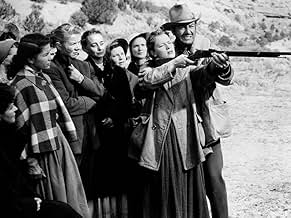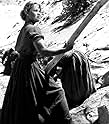AVALIAÇÃO DA IMDb
7,6/10
4,2 mil
SUA AVALIAÇÃO
Adicionar um enredo no seu idiomaA trail guide escorts a group of women from Chicago to California to marry men that have recently begun settling there.A trail guide escorts a group of women from Chicago to California to marry men that have recently begun settling there.A trail guide escorts a group of women from Chicago to California to marry men that have recently begun settling there.
- Direção
- Roteiristas
- Artistas
- Prêmios
- 2 vitórias no total
Claire Andre
- Pioneer Woman
- (não creditado)
Raymond Bond
- Preacher
- (não creditado)
Polly Burson
- Pioneer Woman
- (não creditado)
Archie Butler
- Outrider
- (não creditado)
Claire Carleton
- Flashy Woman
- (não creditado)
Bill Cartledge
- Outrider
- (não creditado)
Mary Casiday
- Pioneer Woman
- (não creditado)
- Direção
- Roteiristas
- Elenco e equipe completos
- Produção, bilheteria e muito mais no IMDbPro
Avaliações em destaque
John McIntire approaches wagonmaster Robert Taylor with an interesting job and challenge. He wants to bring brides west to the settlement he's founded in the southwest United States. Taylor hires on a bunch of hands to escort the women and issues a no fraternization policy. When one of them tries to rape one of them, he shoots him out of hand. It's the unsettled frontier and as wagonmaster he's the law on that train as much as a captain on a ship at sea. Of course the hands mutiny and strand Taylor, McIntire, cook Henry Nakamura and the women.
This was a perfect western film for the post Rosie the Riveter generation. No reason at all why women couldn't deal with the rigors of a wagon train. Of course it helped to have the formidable Hope Emerson along.
Of course men and women will be men and women and Taylor breaks his own no fraternization policy with Denise Darcel. Of course this is away from the train when Darcel runs off.
William Wellman delivers us a no frills unsentimental western with gritty performances by Robert Taylor and the rest of the cast. In a bow to his colleague John Ford, Wellman does have a courtship dance at the settlement. I liked the use of the fiddle music playing Believe Me With All Those Endearing Young Charms and Drink to Me Only With Thine Eyes. Ford couldn't have staged it better.
Henry Nakamura had made a big hit in MGM's Go For Broke about the Nisei division in Italy. He was a funny little guy, I'm not sure he was even five feet tall. I loved the scene when he and Taylor find a stash of buried liquor and proceed on a toot. This was his last film though, roles for oriental players were hard to come by. I wonder whatever happened to him.
If you like traditional cowboy films, this one ain't for you, but given the constraints of 19th century society for the role of woman Westward the Women is quite a revelation.
This was a perfect western film for the post Rosie the Riveter generation. No reason at all why women couldn't deal with the rigors of a wagon train. Of course it helped to have the formidable Hope Emerson along.
Of course men and women will be men and women and Taylor breaks his own no fraternization policy with Denise Darcel. Of course this is away from the train when Darcel runs off.
William Wellman delivers us a no frills unsentimental western with gritty performances by Robert Taylor and the rest of the cast. In a bow to his colleague John Ford, Wellman does have a courtship dance at the settlement. I liked the use of the fiddle music playing Believe Me With All Those Endearing Young Charms and Drink to Me Only With Thine Eyes. Ford couldn't have staged it better.
Henry Nakamura had made a big hit in MGM's Go For Broke about the Nisei division in Italy. He was a funny little guy, I'm not sure he was even five feet tall. I loved the scene when he and Taylor find a stash of buried liquor and proceed on a toot. This was his last film though, roles for oriental players were hard to come by. I wonder whatever happened to him.
If you like traditional cowboy films, this one ain't for you, but given the constraints of 19th century society for the role of woman Westward the Women is quite a revelation.
I thoroughly enjoyed this film about a group of women being led by Robert Taylor's character to their new town. They are a motley bunch but pull together when the men desert them to travel and start a new life with the men they have chosen to be their husbands. Robert Taylor is fantastic as the man being taken to take them through, even though he believes it to be an impossible task. There are some genuinely touching moments in this movie, I had to have my tissues handy in places, but it is well worth a watch. One of the best Westerns I have seen and even better because the women have the chance to take centre stage for a change.
Between 1930 and 1960, 97% of all movies (that's 14729239520520 films) were westerns--or so it would seem. And, sadly, almost all of them have one of about five different plots and variations on these plots. Because of this, I really have very little patience with the genre--though I must admit that I have reviewed quite a few westerns. The ones I like are often ones that are somehow a bit better--despite the familiar plots, fine acting and direction make them watchable. Rarely, very rarely, do I see one that not only has fine acting, direction AND a novel plot--and all that is in "Westward the Women".
The film begins in a remote part of the old west--so remote that there are no women for all the men. Because of this, the men hire a tough trail boss (Robert Taylor) to recruit the women and bring them to a small outpost. The problem, however, is that the only way is a long trek across the prairie--through Indian land and desert. These women sure have to be tough--otherwise they'll never make it. And, in fact, unlike any other western I can think of, many of the women DON'T.
What also makes this a very good film are the nice little characters within the film. So it's NOT just a Robert Taylor film but excels because of the fine ensemble cast. One of the standouts is Hope Emerson--a brawny actress who made a name for herself playing gangsters and other scary characters.
Overall, there's not a lot to dislike about the film and it's a nice little story about American history you don't normally hear. Worth seeing and a top-notch production--with a real lump-in-your-throat ending. Sweet, sentimental and exciting.
The film begins in a remote part of the old west--so remote that there are no women for all the men. Because of this, the men hire a tough trail boss (Robert Taylor) to recruit the women and bring them to a small outpost. The problem, however, is that the only way is a long trek across the prairie--through Indian land and desert. These women sure have to be tough--otherwise they'll never make it. And, in fact, unlike any other western I can think of, many of the women DON'T.
What also makes this a very good film are the nice little characters within the film. So it's NOT just a Robert Taylor film but excels because of the fine ensemble cast. One of the standouts is Hope Emerson--a brawny actress who made a name for herself playing gangsters and other scary characters.
Overall, there's not a lot to dislike about the film and it's a nice little story about American history you don't normally hear. Worth seeing and a top-notch production--with a real lump-in-your-throat ending. Sweet, sentimental and exciting.
"Westward the Women" may not be the greatest western ever made but it's certainly one of the most unusual and is, indeed, very fine and I'm amazed it isn't better known. The women in question are 140 brides being brought West for for the male townsfolk in a Californian valley on a wagon-train lead by Robert Taylor. The director of the picture was William Wellman and William C. Mellor shot it in crisp black-and-white and it has a fine screenplay by Charles Schnee from a story by none other than Frank Capra.
As wagon-train movies go, it's not only unusual but remarkably robust and full of incident and it deals with the male/female dynamic with a surprising degree of honesty and if you don't think so, remember this was 1951. It's certainly not sentimental and Wellman approaches his subject with much the same documentary-like realism that John Ford brought to "Wagonmaster". In a good supporting cast Denise Darcel and Hope Emerson stand out.
As wagon-train movies go, it's not only unusual but remarkably robust and full of incident and it deals with the male/female dynamic with a surprising degree of honesty and if you don't think so, remember this was 1951. It's certainly not sentimental and Wellman approaches his subject with much the same documentary-like realism that John Ford brought to "Wagonmaster". In a good supporting cast Denise Darcel and Hope Emerson stand out.
A brilliant slice of pioneer-era Americana. In no other movie that comes to mind was there such a realistic portrayal of the Old West and its numerous perils than in this faithfully told story of pioneer women crossing the harsh western U.S. wilderness of 1850 from Missouri to California.
The ladies are responding to an ad placed by a leader (on behalf of several other men) in a pioneer settlement out in California for wives. These tenderfoot ladies may be looking for husbands, but there's nothing "weak" about them at all. They not only bravely face the hardships, dangers, and tragedies of the journey, but they soon learn how to handle their own with toughness and grit.
The story unfolds clearly due to a finely structured and developed script. The intertwining stories are well told and well acted. The mostly female cast are all strong, and Robert Taylor as "Buck," the guide and leader of the wagon train seems to enjoy the task of having dozens of female leads surrounding him. John McIntyre as the patriarchal Mr. Whitman (who hires Buck) is good, while Buck's friend, confidant, and comic-relief guy Ito is also a well-rounded character.
The ending is one of the most heartwarming ever in a western; this is the kind of movie that can be watched over and over again.
The ladies are responding to an ad placed by a leader (on behalf of several other men) in a pioneer settlement out in California for wives. These tenderfoot ladies may be looking for husbands, but there's nothing "weak" about them at all. They not only bravely face the hardships, dangers, and tragedies of the journey, but they soon learn how to handle their own with toughness and grit.
The story unfolds clearly due to a finely structured and developed script. The intertwining stories are well told and well acted. The mostly female cast are all strong, and Robert Taylor as "Buck," the guide and leader of the wagon train seems to enjoy the task of having dozens of female leads surrounding him. John McIntyre as the patriarchal Mr. Whitman (who hires Buck) is good, while Buck's friend, confidant, and comic-relief guy Ito is also a well-rounded character.
The ending is one of the most heartwarming ever in a western; this is the kind of movie that can be watched over and over again.
Você sabia?
- CuriosidadesWhen this film was broadcast on Spanish TV in 1985, in a remote mountain village near the French border where most of the inhabitants were male it inspired them to place an ad in some papers, requesting potential female partners from all over the country to come and marry the lonely country boys. As a result, a caravan of coaches loaded with dozens of young women from all over Spain turned up at the village for the blind date, and that day many of those lonely boys found the women of their lives.
- Erros de gravaçãoDuring a shooting lesson one of the men tells one of the women to "aim low that will make up for the recoil". When shooting a gun the bullet has long left the barrel, before the barrel begins to move in recoil. Aim low and you'll miss low.
- Citações
Patience Hawley: [to the awaiting bridegrooms] You can look us over, but don't think you're going to do the choosing! All the way from Independence, I've been staring at two things: one was this picture and the other was the rump of a mule... and don't ask me which was prettier!
- Cenas durante ou pós-créditosThe MGM lion, instead of roaring, is frozen in place.
- Versões alternativasAvalable in a colorized version on home video from Turner/MGM Home Video. Like many colorized versions of films, it was not authorized nor approved by anyone who worked on the film.
- ConexõesFeatured in TCM Guest Programmer: Paul Aguirre (2007)
- Trilhas sonorasTo The West! To The West!
By Henry Russell
Principais escolhas
Faça login para avaliar e ver a lista de recomendações personalizadas
- How long is Westward the Women?Fornecido pela Alexa
Detalhes
- Data de lançamento
- País de origem
- Idiomas
- Também conhecido como
- Caravana de Mulheres
- Locações de filme
- Empresa de produção
- Consulte mais créditos da empresa na IMDbPro
Bilheteria
- Orçamento
- US$ 2.203.000 (estimativa)
- Tempo de duração1 hora 58 minutos
- Cor
- Proporção
- 1.37 : 1
Contribua para esta página
Sugerir uma alteração ou adicionar conteúdo ausente

Principal brecha
By what name was O Poder da Mulher (1951) officially released in India in English?
Responda

